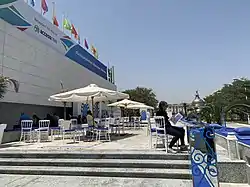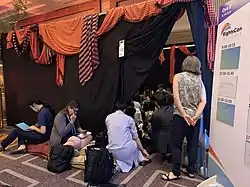Access Now
Access Now is a non-profit founded in 2009 that defends and extends the digital rights of people around the world.
| Formation | 2009 |
|---|---|
| Website | accessnow.org |


As of 2020, Access Now has legal entities in Belgium, Costa Rica, Tunisia, and the United States, with its staff, operations, and activities distributed across all regions of the world.
The organization was given special consultative status to the United Nations Economic and Social Council in 2016.
As of 2018, Access Now received approximately $5.1 million in funding.[1]
History
Access Now was founded by Brett Solomon, Cameran Ashraf, Sina Rabbani and Kim Pham in 2009, after the contested Iranian presidential election of that year.[2] During the protests that followed this election, Access Now played a noted role in disseminating the video footage which came out of Iran.[2]
Policy objectives
Access Now has five primary policy areas:
- Business and Human Rights
- Access Now works with companies to make their practices more transparent, accountable, and human rights-respecting.
- Digital Security
- Access Now works to ensure that individual online activities are private, safe, and secure.
- Freedom of Expression
- Access Now advocates for the right of individuals to speak freely, which is critical for disseminating dissent, guaranteeing a free press, and defending human rights.
- Net Discrimination
- Access Now advocates for a free and open internet, advocating for the net neutrality principle that Internet access should be offered to everyone on a non-discriminatory basis, without favoring certain websites, applications, or services.
- Privacy
- Access Now defends the right of individuals to privacy.
In addition, Access Now has campaigned against internet shutdowns,[3] online censorship,[4] international trade agreements,[5] and government surveillance.[6] Access Now has also supported the use of encryption[7] and thoughtful cybersecurity laws and regulations.[8]
Goals and conference
To achieve its goals, Access Now has organized itself into three main programmatic arms:
- Policy
- Access Now provides principled, pragmatic, and tech-driven policy guidance to governments, corporations, and civil society organizations.
- Advocacy
- Access Now draws on technological, policy, and campaign expertise to engage the global community in the fight to defend and extend the digital rights of users at risk around the world.
- Technology
- Access Now provides technology solutions and real-time advice for activists and civil society in circumstances where communications are not open, free, and secure.
Access Now maintains a Digital Security Helpline to offer real-time, direct assistance and advice to activists, independent media and civil society organizations.[9]
One other activity that Access Now runs is the annual conference, RightsCon, a multistakeholder event that features participants from civil society, tech companies, and users at risk.[10] The conference was first held in Silicon Valley in 2011, followed by events in Rio de Janeiro, Brazil (2012), Silicon Valley (2014), Manila, Philippines (2015), and Silicon Valley (2016),[11] thus alternating between Silicon Valley and a key city in the Global South.[12] After being held in Brussels and Toronto, RightsCon 2019 took place in Tunis, Tunisia (11-14 June). In 2020, RightsCon was scheduled to be held in San José, Costa Rica, but as a result of the COVID-19 pandemic, the meeting will instead take place in a modified online format.[13]
Funding
The majority of Access Now's support comes from foundations and development agencies, with the rest coming from companies, courts, individuals, and civil society organizations. To ensure the independence, and integrity of Access Now, it accepts support contingent upon the following non-negotiables:[14]
- Access Now does not accept funding that places its staff, partners, supported communities, or mission at risk.
- Access Now does not accept funding that jeopardizes its relationship with its partners, stakeholders, or supported communities and networks.
- Access Now does not accept funding that compromises its organizational independence, including funding relationships that may influence its priorities, policy positions, advocacy efforts, regions of focus, or direct action work.
- Access Now does not accept funding that poses a risk to its reputation more broadly or with respect to specific programmatic areas of work.
References
- "Funding | Access". www.accessnow.org. Archived from the original on 2019-07-23. Retrieved 2019-08-03.
- "#iranelection: The digital media response to the 2009 Iranian election". Retrieved 2013-05-18.
- Farrell, Paul. "Human rights groups condemn Nauru's criminalisation of political protest". the Guardian. Retrieved 2015-09-21.
- "Blog | Access". www.accessnow.org. Retrieved 2015-09-21.
- "Blog | Access". www.accessnow.org. Retrieved 2015-09-21.
- Solomon, Brett (2016-05-11). "This Arcane Rule Change Would Give U.S. Law Enforcement New Power to Hack People Worldwide". Slate. ISSN 1091-2339. Retrieved 2016-06-24.
- "Encrypt All The Things". encryptallthethings.net. Archived from the original on 2015-09-27. Retrieved 2015-09-21.
- "What Congress Can Do About Cybersecurity If CISA Fails". Retrieved 2015-09-21.
- "Tech | Access". www.accessnow.org. Archived from the original on 2015-10-01. Retrieved 2015-09-21.
- "RightsCon Summit Series". rightscon.org. Archived from the original on 2015-09-12. Retrieved 2015-09-21.
- "RightsCon Summit Series". rightscon.org. Archived from the original on 2015-09-12. Retrieved 2015-09-21.
- "RightsCon Summit Series". rightscon.org. Archived from the original on 2015-09-12. Retrieved 2015-09-21.
- "Home - RightsCon Summit Series". RightsCon Summit Series. Retrieved 2019-06-16.
- "FUNDING". Access Now. Retrieved 2020-06-16.